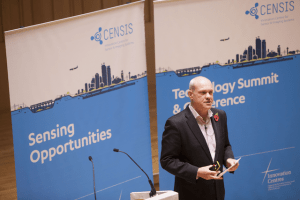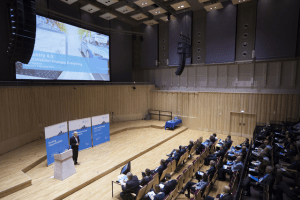
Alan Norbury, Industrial CTO for Siemens PLC was a key speaker at the 4th CENSIS Technology Summit, discussing the impact of digitalisation.
Digitalisation changes all areas of our lives: the way we stay informed, the way we travel, the way we buy things, and the way we manufacture products.
Digitalisation is also changing business models: the pace of innovation and the ability to disrupt are becoming key success factors in global competition.
Digitalisation is putting increasing pressures on manufacturers: there’s an expectation from consumers for products to be designed and manufactured to individual requirements. The automotive industry is a great example of ‘Mass Customisation’. Where every car is manufactured to customer specifications, the amazing thing is that each customised car is produced on the same production line as everyone else’s customised car!
The demand for customisation will cross all sectors, from electronics to food & beverage to construction. One of the most exciting sectors, impacting all our lives, is pharmaceuticals, where the vision of personalised medication is already underway.
Today if you were to visit a doctor’s surgery with an ailment, irrespective of weight, gender, size etc. The doctor will generally prescribe the same medication for a common ailment. In the future medication will be customised to potentially match individual DNA, possibly a combination of medications combined into a single tablet.
So the challenge for manufacturers is:
- How do you ‘Mass Customise’ at the same speed and quality as mass production of the past?
- What technologies and processes will be key to enabling ‘Mass Customisation’?
- Will ‘Mass Customisation’ have an impact on productivity?
 There’s a general perception that increasing productivity is all about making more products with less people. Well that’s not necessarily the case – increased productivity can also be achieved by increasing product value. Customisation to meet individual consumer demands is a way of increasing value.
There’s a general perception that increasing productivity is all about making more products with less people. Well that’s not necessarily the case – increased productivity can also be achieved by increasing product value. Customisation to meet individual consumer demands is a way of increasing value.
‘Mass Customisation’ requires the product to define its own destiny and inform the machine/process what has to be done to it, as opposed to the traditional way of manufacturing where the machines take control of the product. Raw materials will need to have a form of identification e.g. RFID, such that the manufacturing process/machines know which product they are dealing with.
To achieve ‘Mass Customisation’, the processes and machinery need to be very flexible/adaptable to work with the expectation of the product.
Adapting machines and environment to suit the product will require accelerated innovation cycles, such that a change in customer demand can be accommodated throughout the manufacturing process without delay.
Virtualisation has already proven itself as a great tool for accelerating innovation cycles, the ultimate vision being zero physical prototyping. In other words, all the prototyping is completed in the virtual world. Any changes can then be quickly made, modelled and tested in the virtual world before producing the physical equivalent ‘Digital Twin’.
‘Big Data’, if filtered and managed in the right way, will be key to optimising customised manufacturing processes, increasing quality and reducing downtime. ‘Big Data’ from the manufacturing process could ultimately be fed back into the virtual model to ensure any changes to the product design can be accommodated in the manufacturing process. Systems that have the ability to close the loop on the ‘Digital Twin’ as a product is being manufactured are often referred to as ‘Cyber-Physical Systems’.
 In essence, what I’m describing is effectively the underlying principles of the 4th Industrial Revolution, also known as Industry 4.0 #4IR.
In essence, what I’m describing is effectively the underlying principles of the 4th Industrial Revolution, also known as Industry 4.0 #4IR.
Industrial organisations across the globe are trying to address the challenge of digitalisation. Siemens is also on this journey, a journey which is absolutely essential for any organisation trying to remain globally competitive.
Although Siemens is one of the few global companies whose technologies span the width and breadth of Industry 4.0, we are also a key UK manufacturer, having 14 manufacturing facilities in the UK alone.
Siemens plc as a UK manufacturer realises that we need to embrace and invest in digitalisation.
If the value is clearly understood and the principles correctly applied, digitalisation has the capability of increasing productivity & growth, reducing unemployment and ultimately contributing towards a globally competitive high wage economy.